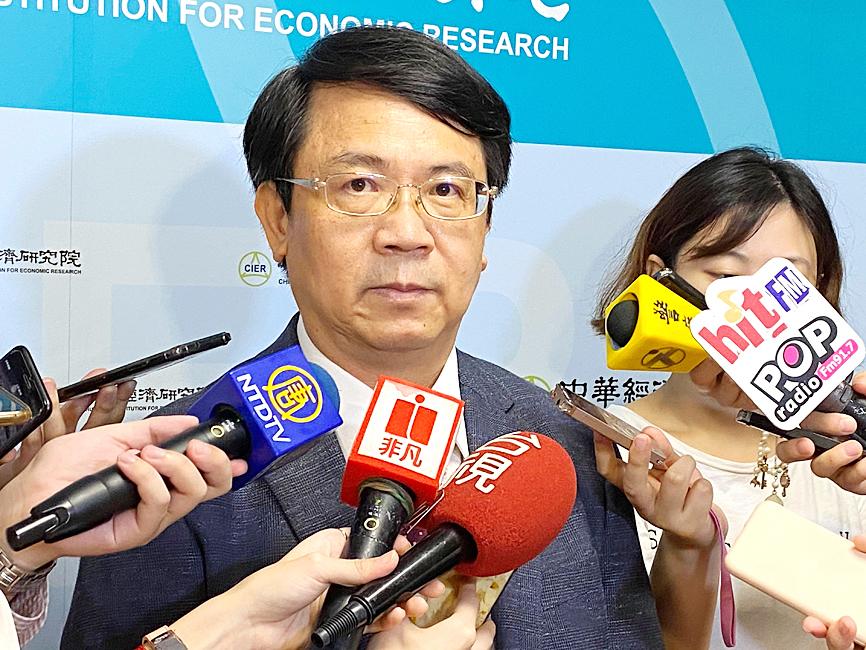The Chung-Hua Institution for Economic Research (CIER, 中華經濟研究院) yesterday raised its forecast for Taiwan’s GDP growth this year to 4.8 percent, as exports continue to gain traction while domestic demand continues to recover from the COVID-19 pandemic.
The Taipei-based think tank, which projected 3.73 percent growth in December last year, said that the economy has chance of expanding 5 percent if uncertainty clears up.
The steep revisions have much to do with positive COVID-19 vaccine results that are allowing people and commodity flows to gradually regain momentum, CIER president Chang Chuang-chang (張傳章) said.

Photo: Wu Chia-ying, Taipei Times
“Private consumption is heating up, while external demand remains vibrant,” Chang said, referring to this year’s economic state.
Domestic demand is expected to be the main growth driver, partly due to a lower comparison base last year, when consumer spending declined 1.24 percent, leaving exports to single-handedly hold up the economy, the institute said.
Private consumption might rise 5.08 percent this year, while private investment could grow 4.38 percent after major technology firms announced plans to upgrade their technology and expand capacity to meet an increase in demand.
Taiwan is home to the world’s top chipmakers, chip designers and suppliers of electronic components used in smartphones, PCs, vehicles and other products.
Chipmaker Taiwan Semiconductor Manufacturing Co (台積電), DRAM chipmaker Nanya Technology Corp (南亞科技) and LCD panel makers AU Optronics Corp (友達光電) and Innolux Corp (群創) have all steeply increased their capital spending for the next few years, CIER researcher Peng Su-ling (彭素玲) said.
The tech and non-tech sectors have both reported that they have more orders than they can digest, as the pandemic has sped up digital transformation by corporations, organizations and individuals.
Exports are likely to grow 17.42 percent and imports 14.85 percent, giving Taiwan a bigger trade surplus and resulting in appreciation of the New Taiwan dollar, CIER said.
The NT dollar might trade at an average of NT$28.39 against the greenback this year, CIER said.
The NT dollar yesterday closed at NT$28.151 against the US dollar in Taipei trading.
The consumer price index, a critical inflation gauge, is forecast to rise 1.31 percent this year, compared with a 0.23 percent contraction last year, CIER said.
The world is closely monitoring inflationary readings, which could cause the world’s central banks to halt monetary easing earlier than expected if drastic price gains are maintained.
CIER said that US-China trade tensions and COVID-19 infections are main downside risks that might slow a global economic recovery.

Jensen Huang (黃仁勳), founder and CEO of US-based artificial intelligence chip designer Nvidia Corp and Taiwan Semiconductor Manufacturing Co (TSMC, 台積電) on Friday celebrated the first Nvidia Blackwell wafer produced on US soil. Huang visited TSMC’s advanced wafer fab in the US state of Arizona and joined the Taiwanese chipmaker’s executives to witness the efforts to “build the infrastructure that powers the world’s AI factories, right here in America,” Nvidia said in a statement. At the event, Huang joined Y.L. Wang (王英郎), vice president of operations at TSMC, in signing their names on the Blackwell wafer to

France cannot afford to ignore the third credit-rating reduction in less than a year, French Minister of Finance Roland Lescure said. “Three agencies have downgraded us and we can’t ignore this cloud,” he told Franceinfo on Saturday, speaking just hours after S&P lowered his country’s credit rating to “A+” from “AA-” in an unscheduled move. “Fundamentally, it’s an additional cloud to a weather forecast that was already pretty gray. It’s a call for lucidity and responsibility,” he said, adding that this is “a call to be serious.” The credit assessor’s move means France has lost its double-A rating at two of the

AI BOOST: Although Taiwan’s reliance on Chinese rare earth elements is limited, it could face indirect impacts from supply issues and price volatility, an economist said DBS Bank Ltd (星展銀行) has sharply raised its forecast for Taiwan’s economic growth this year to 5.6 percent, citing stronger-than-expected exports and investment linked to artificial intelligence (AI), as it said that the current momentum could peak soon. The acceleration of the global AI race has fueled a surge in Taiwan’s AI-related capital spending and exports of information and communications technology (ICT) products, which have been key drivers of growth this year. “We have revised our GDP forecast for Taiwan upward to 5.6 percent from 4 percent, an upgrade that mainly reflects stronger-than-expected AI-related exports and investment in the third

RARE EARTHS: The call between the US Treasury Secretary and his Chinese counterpart came as Washington sought to rally G7 partners in response to China’s export controls China and the US on Saturday agreed to conduct another round of trade negotiations in the coming week, as the world’s two biggest economies seek to avoid another damaging tit-for-tat tariff battle. Beijing last week announced sweeping controls on the critical rare earths industry, prompting US President Donald Trump to threaten 100 percent tariffs on imports from China in retaliation. Trump had also threatened to cancel his expected meeting with Chinese President Xi Jinping (習近平) in South Korea later this month on the sidelines of the APEC summit. In the latest indication of efforts to resolve their dispute, Chinese state media reported that